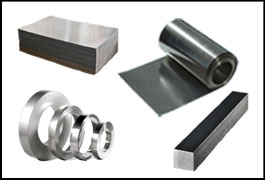Call Us:
- Home
- / Stainless Steel Products
Stainless Steel Products
Lester Metals offers premium stainless steel products in Alloys 300 and 400 Series including foil, sheet, plate and bar in rolls and sheets slit to your specifications. The most common is 304 stainless steel also referred to as 18/8 stainless steel because it's 18% Chromium and 8% Nickel.
The thickness or gauge of the material is what determines whether is is called foil, sheet or plate. Stainless Steel foil material thickness ranges from .0005" to .0079". Stainless Steel sheet material thickness ranges from .008" to .0125". Stainless Steel plate and bar material thickness ranges from .0125" to 5.00".
Lester Metals offers high quality and fast shipping on both large and small quantities for many applications including automotive, electrical, embossing, etching, spinning, flashing, building products, manufacturing and research and development.

About Stainless Steel
In metallurgy, stainless steel is defined as a steel alloy with a minimum of 10.5 or 11% chromium content by mass. Stainless steel does not stain, corrode, or rust as easily as ordinary steel, however it is not stain-proof. It is also called corrosion-resistant steel or CRES when the alloy type and grade are not detailed, particularly in the aviation industry. There are different grades and surface finishes of stainless steel to suit the environment to which the material will be subjected in its lifetime. Stainless steel is used where both the properties of steel and resistance to corrosion are required.
Stainless Steel versus Carbon Steel
The difference between stainless steel and carbon steel is the amount of chromium present. When exposed to air and moisture carbon steel rusts. Iron oxide (or rust) is active and accelerates corrosion by forming more iron oxide. Stainless steel contains sufficient chromium to form a passive film of chromium oxide, which prevents further surface corrosion and blocks corrosion from spreading into the metal's internal structure.
